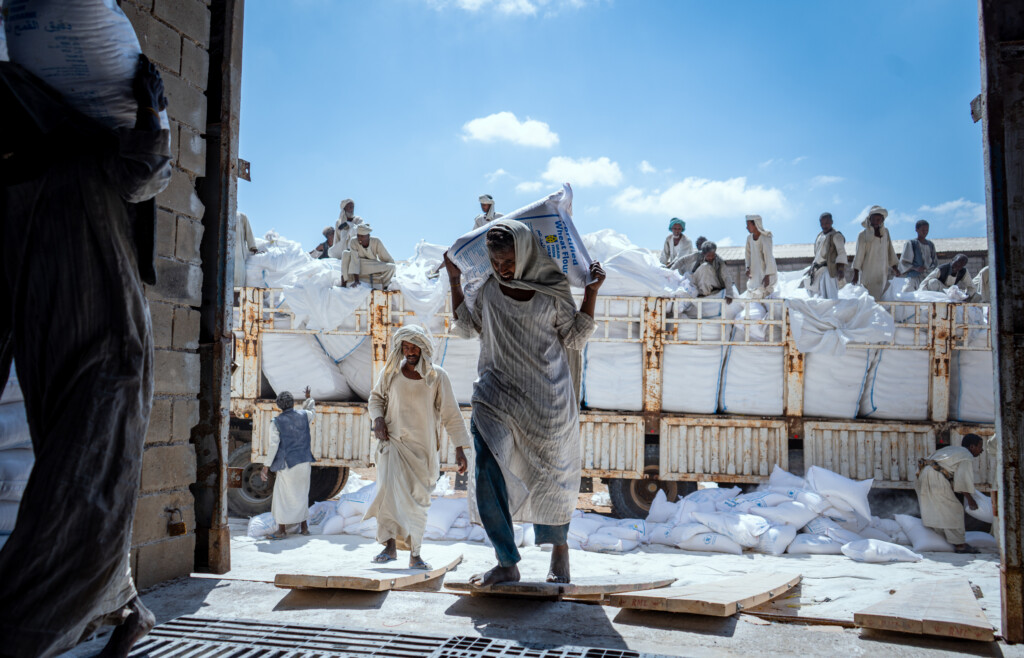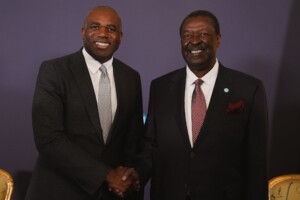Chad-Sudan aid supply ban leaves Darfur families ‘teetering on the edge’

Emergency food aid from Ukraine arrives in Port Sudan in February (Photo: WFP / Abubaker Garelnabei)
Sudan’s acting Minister of Foreign Affairs, Ali El Sadig, has voiced opposition to the delivery of humanitarian aid to Sudan across the border from Chad. During a meeting with the deputy executive director and chief operating officer of the UN World Food Programme, Carl Skau, on the sidelines of the three-day Antalya Diplomatic Forum in Turkey on Friday, El Sadig asserted that “after it was proven that the Chadian border was used for arms transfers to the Rapid Support Forces (RSF), the security and stability of the country [Sudan] cannot be compromised.”
A statement by Sudan’s acting Ministry of Foreign Affairs says that El Sadig “advised the WFP deputy director to purchase food from local markets to meet the needs of the people in Darfur, in addition to examining the possibility of bringing in humanitarian aid via agreed routes”.
The minister stressed the necessity of delivering humanitarian aid to those in need in various regions of the country and overcoming the difficulties that hinder the delivery of this aid.
In a statement to Radio Dabanga today, in the wake of El Sadig’s comments, WFP Sudan expresses deep concern about the humanitarian implications of the closure of the cross-border operations from Chad into western Sudan.
WFP: ‘Restrictions on humanitarian traffic across the border from Chad will impede WFP’s plans to support around one million people in West and Central Darfur each month…’
“This will impede WFP’s plans to support around one million people in West and Central Darfur each month. Already more than 1.7 million people in the Darfur region are one step away from catastrophic hunger.” WFP laments: “Without assistance, families that are already teetering on the edge of survival will face deeper levels of hunger and malnutrition as needs continue to skyrocket across the region.”
JEM: ‘Preventing the arrival of aid reflects abhorrent racism…’
The Justice and Equality Movement (JEM) and the Sudan Liberation Rally announced their strict opposition to the Sudanese government not allowing humanitarian aid to enter through Chad.
The JEM stated that “preventing the arrival of aid reflects abhorrent racism” and asserted that the government decision preventing the arrival of humanitarian aid to the Darfur regions through Chad, “comes at a time when the humanitarian and commercial convoys that were moving from Kosti to the Kordofan and Darfur regions stopped.
“This irresponsible statement aims to bring people to their knees with hunger, disease, and destitution,” JEM said.
’Preventing aid delivery represents a crime against humanity…’
The Sudan Liberation Forces Rally (SLFR) also condemned the prevention and obstruction of the delivery of humanitarian and relief aid to Darfur and Sudan.
It called on both sides of the conflict in Sudan to allow and facilitate the delivery of humanitarian aid and relief to those affected in Darfur and the rest of the areas affected by the war. “Preventing the delivery of aid represents a crime against humanity, and is a weapon used by elements of the former regime to cause famine and a humanitarian catastrophe in Darfur and areas outside their control.”
The SLFR called on the United Nations and the UN Security Council to pressure both sides of the war to immediately stop the war and stop the massacres and violations against defenceless civilians. It also appealed to humanitarian organisations to expedite the delivery of urgent relief and humanitarian aid to the displaced and those affected by the war in Darfur and Sudan.
Shipments
Last week, the US State Department expressed its deep concern about the recent decision taken by the Sudanese Armed Forces (SAF) to ban cross-border humanitarian aid from Chad.
As previously reported by Radio Dabanga, a shipment of 7,600 tonnes of emergency food aid donated by Ukraine to the United Nations World Food Programme (WFP) Sudan operation, has arrived in Port Sudan. The wheat flour is being loaded onto WFP trucks for emergency food distribution.
WFP says that the shipment – part of Ukraine’s humanitarian ‘Grain from Ukraine‘ initiative launched by President Zelensky – was made possible by the German Federal Foreign Office, which covered the operating costs of €15 million, including the transportation costs from Ukraine to Sudan, and the implementation and distribution within the country to people in need.
In February, WFP warned that the vast majority of Sudanese face severe hunger, with more than five million people unable to have one adequate meal per day, amidst 10 months of war between the Sudanese Armed Forces (SAF) and the paramilitary Rapid Support Forces (RSF).
During a press conference in the Belgian capital of Brussels, WFP Sudan Director Eddie Rowe said that “five million people in Sudan cannot afford a square meal a day”.
18 million people across Sudan face severe food insecurity, and “10 per cent of the population, close to five million people, are on the precipice of catastrophe”, the second-worst emergency classification used by the WFP before famine, Rowe told reporters.
WFP previously warned of difficulties accessing people affected by the ongoing war, reaching “only 10 per cent of those in need”, according to WFP East Africa Director Michael Dunford.
Rowe told reporters earlier this month that “WFP has food in Sudan, but lack of humanitarian access and other unnecessary hurdles are slowing operations and preventing us from getting vital aid to the people who most urgently need our support”.
WFP operations are also facing a severe lack of funding, of which there is a $300million gap, the UN organisation said on February 19.











 and then
and then